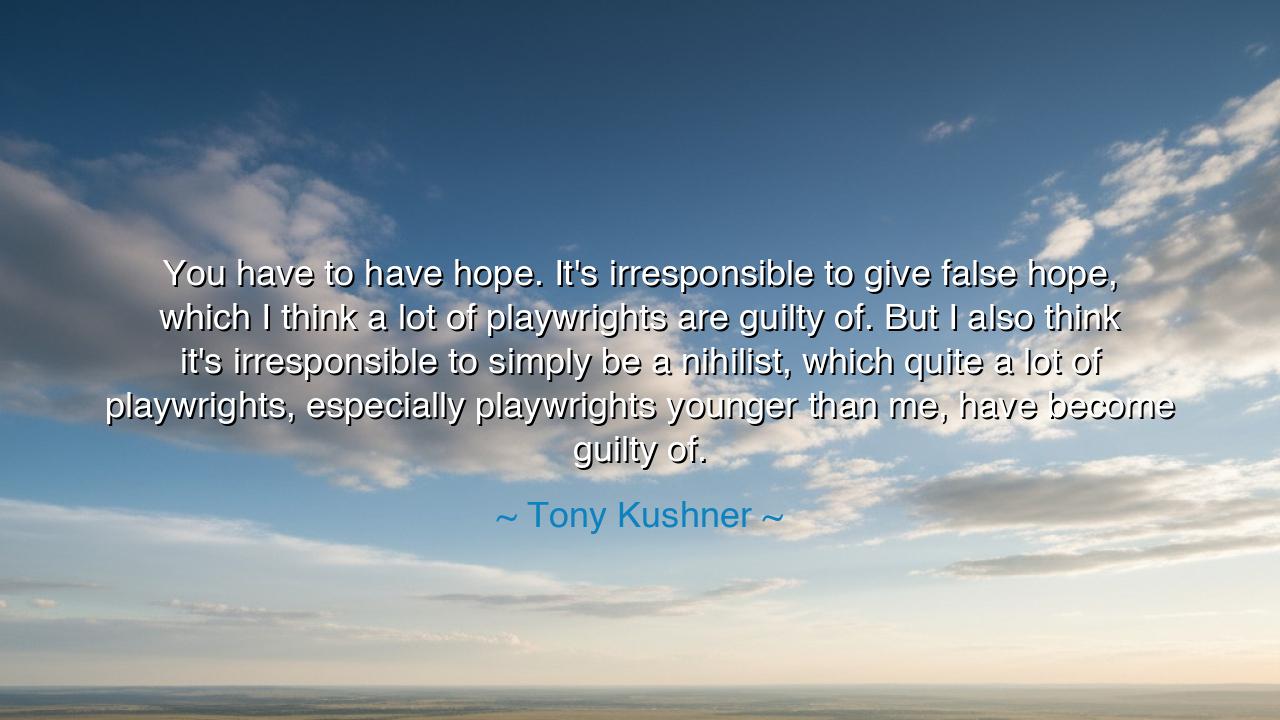
You have to have hope. It's irresponsible to give false hope
You have to have hope. It's irresponsible to give false hope, which I think a lot of playwrights are guilty of. But I also think it's irresponsible to simply be a nihilist, which quite a lot of playwrights, especially playwrights younger than me, have become guilty of.






When Tony Kushner declared, “You have to have hope. It’s irresponsible to give false hope, which I think a lot of playwrights are guilty of. But I also think it’s irresponsible to simply be a nihilist, which quite a lot of playwrights, especially playwrights younger than me, have become guilty of,” he spoke as both artist and philosopher, balancing on the eternal line between truth and despair. In these words lies a teaching not only for creators, but for all who seek meaning in a world that often trembles between hope and hopelessness. Kushner, the author of Angels in America, a play that wrestles with suffering, faith, politics, and love, understood the sacred responsibility of the storyteller—to reflect the world as it is, yet also to illuminate what it might become. His message is clear: honest hope is a duty, but so is honest truth. To live, to write, or to lead without either is to betray the soul.
The origin of this quote lies in Kushner’s lifelong dialogue with history and human endurance. Born into a world marked by Cold War anxieties, the AIDS crisis, and the failures of power, he watched generations struggle with grief and injustice. Many artists responded to such chaos with cynicism, believing that the only truth worth telling was one of despair. But Kushner refused to surrender to that void. His masterpiece, Angels in America, depicts not blind optimism but hope amidst devastation—hope that emerges not from denial, but from resilience. To him, art that lies by promising easy salvation is as harmful as art that kills the human spirit by mocking the very idea of meaning. In that balance, between false hope and nihilism, lies the wisdom of a man who sees the world not as a tragedy, but as an unfinished creation.
In his words, we hear echoes of the ancients. The Greek playwrights—Sophocles, Euripides, Aeschylus—wrote of gods and men entangled in fate and suffering, yet their tragedies were never empty of purpose. Even in the destruction of Oedipus or the mourning of Antigone, there was the shimmer of insight, the glimmer of moral awakening. Tragedy did not annihilate meaning; it revealed it. The Greeks, like Kushner, understood that the artist’s role was not to comfort with illusions nor to crush with despair, but to teach the soul to see clearly and still endure. To tell the truth and still affirm life—that is the highest form of art, and the deepest act of courage.
This balance between truth and hope is not confined to art—it is the very struggle of civilization. Consider the life of Viktor Frankl, the psychiatrist and Holocaust survivor who, amidst the horrors of the concentration camps, found a philosophy of meaning. In his book Man’s Search for Meaning, Frankl wrote that those who survived were not necessarily the strongest, but those who held on to purpose. Yet he warned, as Kushner does, against false hope—against pretending that suffering does not exist or that all will end well without struggle. His was a hope born of responsibility, not fantasy: the courage to face the truth of pain while still believing in the worth of life.
Kushner’s words also carry a challenge to the artists of the modern age. Too often, he laments, the stage has become a mirror of despair—filled with voices that sneer at the possibility of redemption, that call love an illusion and faith a joke. In rejecting sentimentality, they have embraced nihilism, a belief in nothing at all. But art that believes in nothing can heal no one. The playwright, like the prophet of old, must not only expose the disease but also offer a vision of healing. To give hope is not weakness—it is service. It is the recognition that even in the darkest night, humanity still yearns for light, and that the telling of truth should not extinguish that yearning but refine it.
And yet, Kushner warns, false hope is as dangerous as despair. To promise salvation without effort, or progress without pain, is to insult the truth of existence. True hope must be earned—it must emerge from the fire of truth, tempered by struggle and humility. The storyteller who denies suffering does not comfort his audience; he cheats them of their strength. The one who paints a world of perfect endings is no wiser than the one who paints a world of endless ruin. Both are blind. Only he who sees the world’s wounds and still believes in its healing, who sees its cruelty and still calls for compassion—only he speaks with wisdom.
So, my children of the word and of the world, remember this: hope is not a luxury—it is a discipline. It must be cultivated like a garden, guarded against both weeds of falsehood and droughts of despair. When you speak, speak truth; when you act, act with love; and when you dream, dream responsibly. The world does not need illusions—it needs vision. It does not need empty optimism—it needs courage that endures. Be neither the liar who promises too much nor the cynic who believes in nothing. Stand, as Tony Kushner stands, in the space between—where the heart is honest, the eyes are open, and the spirit still dares to hope. For only there, in that sacred tension, is the real hope that keeps humanity alive.






AAdministratorAdministrator
Welcome, honored guests. Please leave a comment, we will respond soon